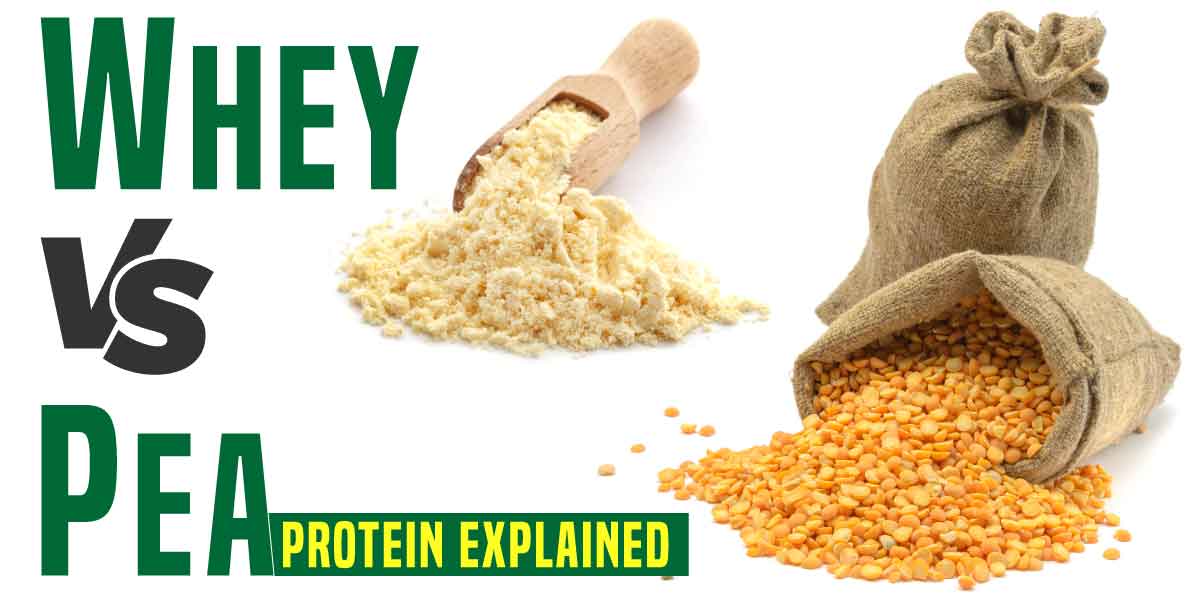Pea vs Whey Protein

Pea protein powder has become increasingly trendy within the plant-based protein supplement industry. With the rise in popularity, many have questioned the benefits of pea protein as compared to whey protein, the reigning leader in the fitness community.
Differences between Whey and Pea Protein
Protein, regardless of its source, is an essential building block for the growth, repair, and general function of muscle tissue. The scientific portions of the debate on whether a protein-rich diet serves benefits to active lifestyles have long since abated. However, with the rise of intolerance (IBD/IBS), allergens, dietary preferences, and or restrictions have increased the demand for alternative solutions to the once uncontested animal-based proteins.
With the growing popularity of plant-based diets, plant-based proteins are now saturating the market. Among the variety of options (hemp, soy, chia, etc.), pea protein has emerged as the most worthy substitute in many regards to whey protein. In this article, we explore the key differences between whey and pea protein, and which may be the best choice for you.
What is Whey Protein?
Whey protein is one of the primary proteins found in cow's milk and is a natural byproduct of cheese production. Whey protein is one of the most readily available "complete" proteins, meaning it contains a significant amount of all nine essential amino acids.
Whey protein is most prevalent in two forms, concentrate & isolate, and is proven to build lean muscle mass and naturally stimulate protein synthesis due to its high leucine content. It is the most abundantly consumed protein in the health and fitness community due to its ability to promote muscle & strength gain spiking the blood with both amino acids & insulin. Additionally, whey protein is known to lower blood pressure, accelerate weight loss, and reduce inflammation.
The benefits of genuinely grass-fed whey far exceed those offered by conventional whey protein in terms of macronutrient density. Protein fractions such as Lactoferrin and Immunoglobulins (Ig) make a substantial nutritional difference, which is also why grass-fed whey protein has gained popularity.
Learn More About Grass-Fed Whey Protein Fractions & Macro-NutrientsLearn More About Whey Protein Isolate vs. Whey Protein Concentrate
Learn More About Milk Protein Composition (Infographic)
What is Pea Protein?
Pea protein is a plant-based protein harvested from yellow split peas. The protein extraction process involves 2 phases, a dry and liquid phase.
- Dry - In the dry phase, the peas are dried and then ground into a fine flour-like powder containing protein, starch, & fiber.
- Liquid - In the liquid phase, the powder is mixed with water to separate the fiber and starch.
Like whey, pea protein is also available in both concentrate and isolate. The additional processing in isolate results in the highest protein concentration relative to pea protein concentrate, which comes with more starch & fiber.
The Dangers of Pea Protein?
It's not common knowledge, but China is the global leader of pea importation, hitting volumes above 1,000,000 metric tons annually.
The majority of the peas imported come from Canada and the United States. It is next to impossible to find a pea protein powder for sale in the United States that isn't manufactured in mainland china and therefore exposed to all the manufacturing food risks endemic to the country.
Pairing the typical quality assurance and control lapses associated with overseas production of this scale with the Dietary Health Supplementation Education (DHESA) Act makes pea protein in the U.S. one of the most dangerous protein tubs on the shelf. Heavy metals & cross-contamination are two genuine concerns one should research before subscribing to pea protein brands.
Professional Tip - California does an excellent job of making public supplement brand violations of Proposition 65 (heavy metals). Simply "Google" the brand name and search for warning letters as a quick and easy check for that warm and fuzzy feeling.
The current DHSEA laws in the United States do not force brands to disclose the processing origins; as a result, these companies make statements such as "100% Split Yellow Pea Protein Grown in the U.S.A. or Canada", or "Pea Protein from U.S. and Canada Farms". Although probably true, the sources of critical risk exist between the farm and the plastic tub the final product is housed in.
Glyphosate in Pea Protein?
Glyphosate is a herbicide that's wreaking havoc on pea protein brands globally. Although the scientific data supports all sides of this global debate, glyphosate and heavy metals do not belong in our food. If you are consuming a pea protein routinely and there is no mention of glyphosate testing, consider pressing the brand for assurance.
Learn More: Glyphosate & Protein Powder
Is Pea Protein a "Complete" protein?
All protein sources have a unique amino acid profile. A "complete" protein is a protein that contains all nine essential amino acids, which include the following: including histidine, isoleucine, leucine, lysine, methionine, phenylalanine, threonine, tryptophan, and valine. Within an amino acid profile contains "branched-chain amino acids (BCAAs), which are a group of three essential amino acids: leucine, isoleucine, and valine. BCAA's boost muscle growth and boost exercise performance.
The body cannot make essential amino acids; therefore, they must come from nutrition and diet.
Animal proteins, including whey, are considered complete proteins, while most plant-based proteins are incomplete, meaning they are missing essential amino acids.
Pea protein is the exception in that it does contain all nine essential amino acids and is considered one of the most "complete" plant-based proteins in the industry. However, it does not provide a comparable amount of each amino acid relative to animal-based proteins such as whey. Specifically, it lacks methionine, which is vital in new blood vessel growth and needed to produce cysteine, which is the primary precursor to the body's natural production of the antioxidant, Glutathione.
Learn More:
Everything You Need To Know About Cysteine
Everything You Need To Know About Glutathione
Is Whey Better Than Pea Protein?
The answer to this question is that "it depends." Pea protein is free of dairy, which for vegans and people with lactose intolerance can play a critical role in achieving protein macros. However, whey protein is a common choice among active, athletic populations due to its superior amino acid profile and muscle building affinity.
Benefits of Pea Protein
The primary benefit of pea protein is that it is a plant-based protein. It does not contain any of the most common allergens such as milk, eggs, nuts, or wheat, which do affect more individuals regardless of health than one would think.
Despite it being a plant-based protein, pea protein is considered a "complete" protein and a good source of BCAA's (leucine, isoleucine, and valine), which promotes muscle growth. Though it lacks in methionine, it contains more arginine than whey protein. Arginine supports healthy blood flow and heart health.
Pea protein is also very rich in iron relative to other plant-based proteins, though it is typically less absorbable than iron found in animal-based protein.
Why is Whey Better than Pea Protein?
As mentioned, pea protein offers many benefits and is an excellent alternative for people with dietary restrictions. If the diet is not a limiting factor, there are many reasons why whey protein powder is the top choice among the fitness community.
- Whey protein has higher grams of protein per serving than pea protein. A pea protein isolate typically contains 21g of protein per serving. In comparison, AGN Roots Grass Fed whey protein isolate contains 25g of protein per serving.
- Whey protein has a complete amino acid profile. Every source of protein has a different amino acid profile, which determines how the protein breaks down once digested. Animal-based protein, and specifically grass-fed whey protein, contain a substantial amount of all nine essential amino acids. To achieve the same amino acid profile with pea protein, you need to combine different sources of protein that have complementary amino acids to ensure your body receives the optimal ratios.
- Whey protein is better for muscle building than pea protein. The ability to build muscle is directly related to the amino acid profile. Though pea protein is a "complete" protein and contains BCAAs (making it a better choice among other plant-based proteins), it does not compete with the muscle-building benefits of whey protein. Whey protein has high leucine content, is rapidly digested by the body, and dramatically stimulates muscle protein synthesis (M.P.S.).
- Whey protein is better for weight loss than pea protein. For the same reasons that whey is better for muscle building than pea protein, it is also better for weight loss. The amino acid profile of whey protein allows for quick absorption by the body. Providing what the body needs and faster will generally reduce feelings of hunger faster as well. On the other hand, similar to casein proteins, pea protein tends to take more time, making their journey through the gastrointestinal tract (mechanically sticky), thus lowering appetite. When proteins like pea or casein take their time in the stomach, they contribute to a bloating sensation; this can result in the desire to consume fewer calories in general.
- Pea protein contains an unattractive taste and texture. Though pea protein may not taste exactly like peas, it is known to have an earthy, vegetative flavor and can have a chalky, gritty texture. The flavor and texture can be challenging to hide in protein shakes, which leads various brands to add chemical masking agents or additives. The flip-side is to provide an unflavored pea protein, which often gets compared to powdered cardboard. Unflavored grass-fed whey takes the "best in show" award when it comes to delivering maximum versatility and naturally great tasting.
What is the Best Pea Protein Powder?
Whether you are choosing whey or pea protein as your supplement of choice, it is essential to choose carefully and read the nutrition facts label. Consider the following when selecting either whey or pea protein powder:
- High-quality proteins should contain only 1-2 ingredients (i.e., pea protein isolate or whey protein isolate). Avoid products with excess fillers or thickeners (gums).
- Avoid flavored proteins in general, if possible. Processed pea proteins with added sugars or artificial sweeteners will not provide you the best solution. In general, the sweeteners to avoid are sucralose, aspartame, acesulfame potassium & stevia. Even brands that market "organic coconut sugar" don't do a great job at disclosing how this is simply a euphemism for refined sugar. Sugar in moderation is good; refined sugar is always terrible.
- Sourcing matters! Look for certifications that support clean sourcing such as Non-GMO. In the case of whey, sustainable farming practices supported by Animal Welfare Approved certifications is a crucial differentiator. Pea protein is notorious for coming out of China. Brands will claim to purchase the yellow peas from the U.S.A. or Canada; however, 100% of these brands do not disclose that these peas all ship to China before being made into protein powers for sale.
Regardless of whether you choose whey or pea, protein is essential for building muscle, bones, and a variety of other body functions. Combine your protein supplement with healthy, balanced meals to receive the maximum benefits.
References



1 comment
pea protein makes me sick every time I drink it. Must be the heavy metals and pesticides from china.